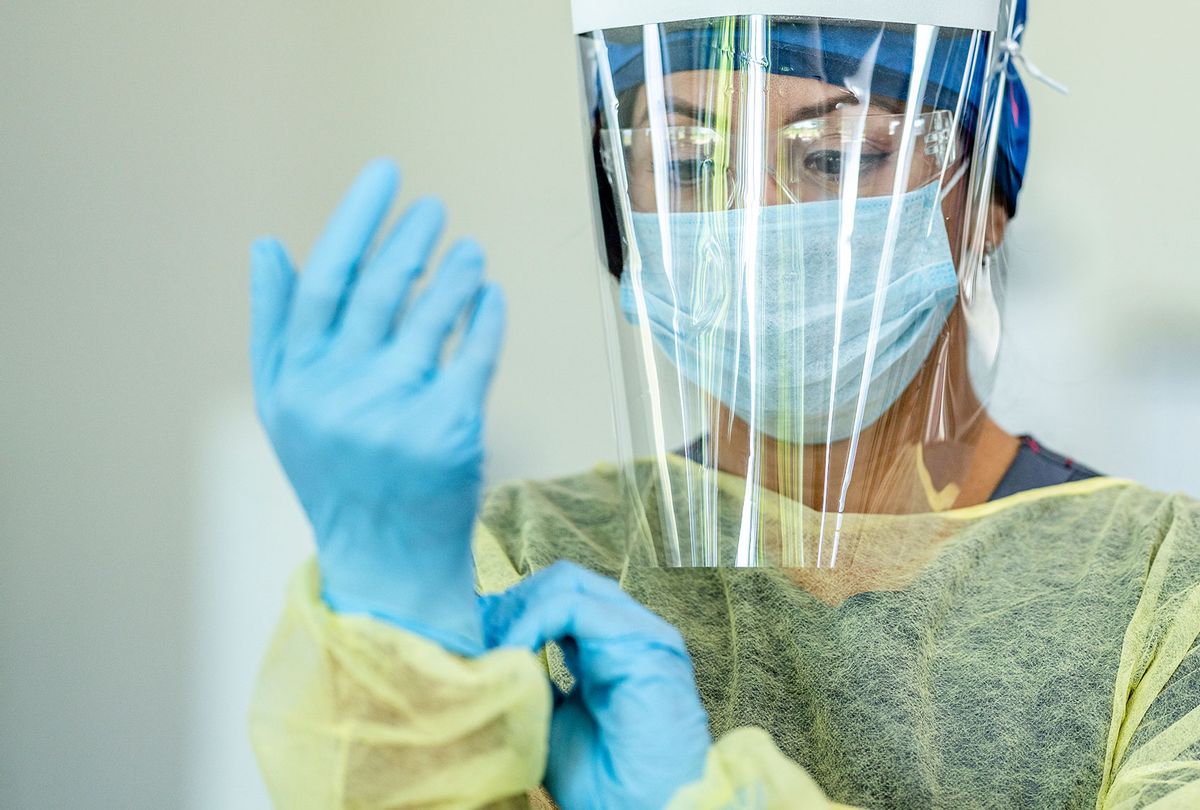New data from the Centers for Disease Control and Prevention (CDC) reported Friday emphasizes the importance of wearing the right mask while in a high-risk setting.
According to the data, surgical masks reduce the risk of testing positive for COVID-19 by 66 percent. More effective masks, like N95 and KN95 masks, decrease the risk of infection by 83 percent. A KN95 filters 95 percent of particles, and so does an N95. A KF94 filters 94 percent of particles. The difference between the letters is the government standard certification.
"These data from real-world settings reinforce the importance of consistently wearing face masks or respirators to reduce the risk of acquisition of SARS-CoV-2 infection among the general public in indoor community settings," the CDC said in its Morbidity and Mortality Weekly Report.
The research was conducted by the California Department of Public Health between Feb. 18 and Dec. 1, 2021 — before the omicron variant wave took off. The researchers surveyed 652 people who recently tested positive for the coronavirus and 176 who had tested negative. All of the participants were asked whether they had been in schools, restaurants, stores, churches or another public indoor setting within 14 days before getting tested, and whether or not they had worn a mask.
Want more health and science stories in your inbox? Subscribe to Salon's weekly newsletter The Vulgar Scientist.
This research adds to the evidence that surgical masks, N95 and KN95 masks, are better than cloth masks. Nearly two years into the pandemic, guidance on masking has changed quite a bit. In the beginning, public health officials told the public not to buy masks because they should be saved for medical professionals. Then, any kind of mask was advised, including cotton and cloth masks that many sewed at home. Most recently in January, the CDC updated its guidance on face masks, saying loose cloth masks offer the least protection against COVID-19. While their stance is still any mask is better than no mask, it has become more clear that cloth masks are less effective.
So, does that mean that everyone should wear surgical masks, N95 and KN95 masks all the time?
"My recommendation on masks obviously depends on context, even though it may appear that we're peaking with respect to the current omicron wave, we're still at a level where infections are high, and more importantly, hospitalizations have not completely fallen off yet," Dr. Jahan Fahimi, who's the Medical Director for the emergency department at the University of California–San Francisco (UCSF), told Salon."And so whether it's hospitalizations for or with COVID, what we're recognizing is that it is still posing a pretty significant burden on the healthcare system, and so for that reason I would continue to recommend pretty liberal use of masks for all indoor spaces."
Fahimi said as numbers fall, that can be reevaluated. For low-risk people who are vaccinated and boosted and around other low-risk people who are vaccinated and boosted, outside of their households, Fahimi said he'd recommend wearing surgical masks.
However, if you're in a crowded space with little ventilation — like an airport — an N95 is appropriate. For Fahimi, as an emergency physician, he always wears an N95 at work. Outside of work, he wears a surgical mask.
"I wear regular surgical masks, and I just make sure that I have a good sort of seal on that surgical mask, that makes sure that the nose bridge is high and, and well fitted on the top of my nose, and obviously, I don't take it down, I don't let it slide down," Fahimi said. "And to be totally honest, when I see folks who are wearing a cloth mask that slides down below their nose, I keep six feet of distance."
RELATED: Is my mask good enough to fight omicron?
Dr. Monica Gandhi, infectious disease doctor and professor of medicine at the UCSF, told Salon that there are six masks that she believes fit well and filter out the coronavirus effectively.
"I always recommend one of these six: an N95, KN95, FFP2, KF94, double mask (cloth plus surgical) or a cloth mask with a pocket for a filter," Gandhi said. "I wrote a paper with Linsey Marr where we explore the protection of the latter two options and find strong protection."
Gandhi said her personal favorite is the cloth mask that has a filter inside.
"The filter made of polypropylene material physically repels the virus (the polypropylene is negatively charged and so is the virus)," Gandhi said. "It is the lightest, thinnest option with the best protection and I find it the most comfortable. Moreover, you can wash the cloth mask and change the filter regularly; I change the filter every 2 days and wash the mask every 3-4 days."
Dr. Amesh Adalja, who works in an intensive care unit, said when he is required to wear a mask he wears a surgical one that he usually obtains from the hospitals where he is on staff. He changes his mask everyday.
Read more on the omicron variant:



Shares